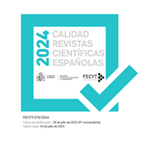Creencias de docentes en formación con relación al uso del voseo chileno en el contexto cotidiano y educativo
Resumen
Actualmente, el voseo verbal juega un rol preponderante dentro de las formas de tratamiento en Chile, el que es usado en el habla cotidiana, especialmente, en situaciones de confianza y cercanía, y en el habla espontánea o informal, además como medio para alcanzar metas comunicativas. Pese a ser un fenómeno ampliamente estudiado, las investigaciones sobre su uso en contextos educativos, así como en la formación inicial docente, son escasas, por lo que se desconoce el tratamiento específico que los profesores otorgan a la aparición de formas voseantes en contextos escolares. Este estudio explora las creencias sobre el uso de voseo que poseen los profesores en formación del área de Lenguaje de 4 universidades chilenas, con muestras recolectadas a través de entrevistas y cuestionarios. Los resultados permitieron caracterizar las creencias de los participantes sobre el uso de estas formas de tratamiento, ya sea en el contexto educativo o cotidiano y su relación con el prestigio encubierto que estas detentan en Chile. (p. 157)
Descargas
Descarga artículo
Licencia
La revista Círculo de Lingüística Aplicada a la Comunicación, para fomentar el intercambio global del conocimiento, facilita el acceso sin restricciones a sus contenidos desde el momento de su publicación en la presente edición electrónica, y por eso es una revista de acceso abierto. Los originales publicados en esta revista son propiedad de la Universidad Complutense de Madrid y es obligatorio citar su procedencia en cualquier reproducción total o parcial. Todos los contenidos se distribuyen bajo una licencia de uso y distribución Creative Commons Reconocimiento 4.0 (CC BY 4.0). Esta circunstancia ha de hacerse constar expresamente de esta forma cuando sea necesario. Puede consultar la versión informativa y el texto legal de la licencia.











